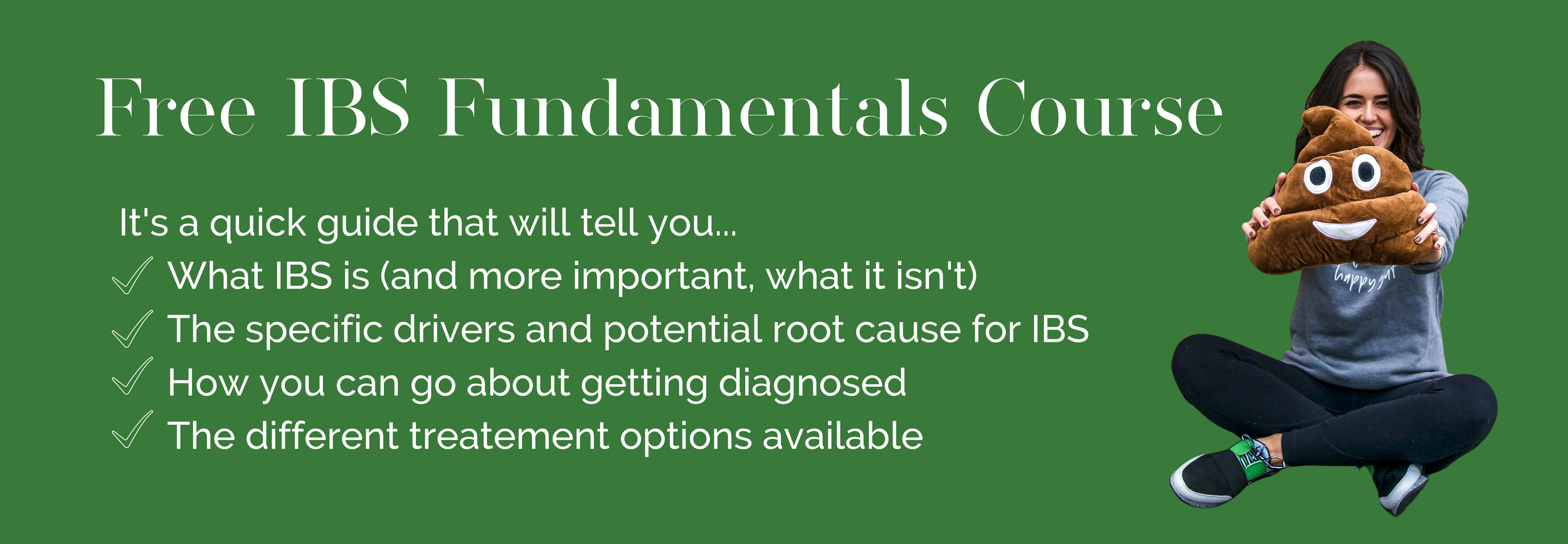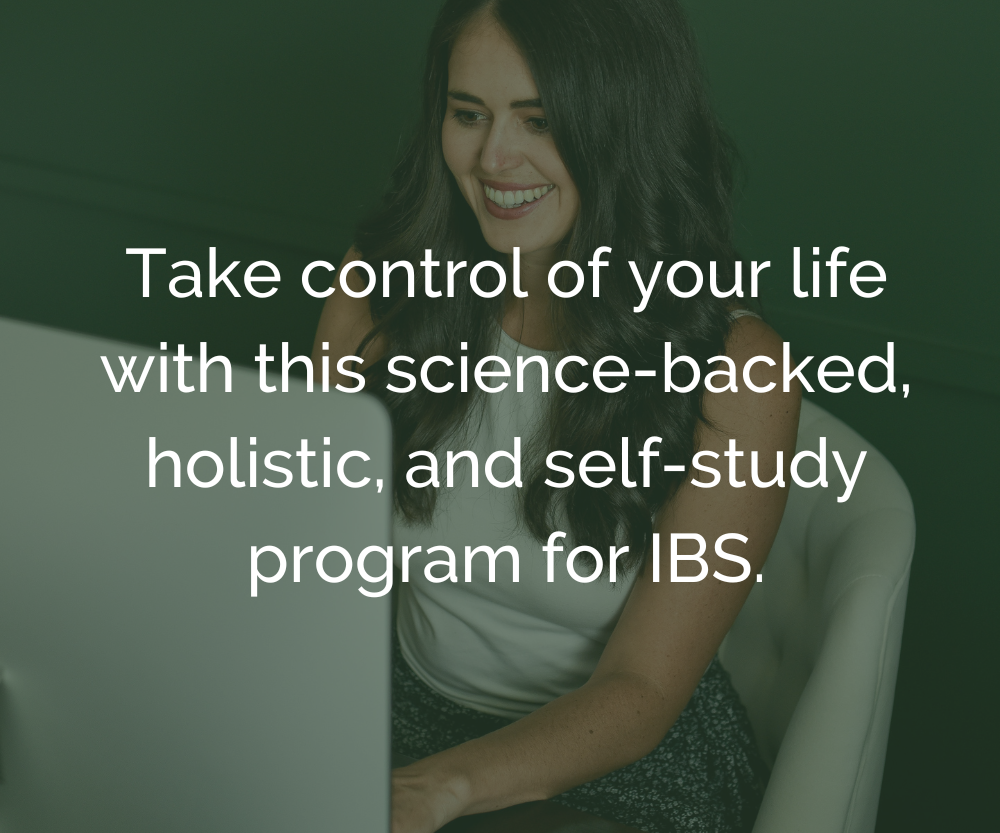You have IBS. Now what?
If you’re here, you’ve likely been told you have IBS or that you could have IBS
There’s a lot of misinformation out there around what IBS actually is and what you should do about it, so my goal for this article is to break things down for you so you feel more confident in the next steps you take.
What is IBS?
IBS, irritable bowel syndrome, is a functional disorder of gut-brain interaction, that is part of a group of conditions called functional gastrointestinal (GI) disorders. This primarily impacts the large intestine and is marked by chronic gastrointestinal symptoms and changes in gut motility.
IBS is officially diagnosed via the Rome IV criteria, based on symptoms and their duration. This means that an IBS diagnosis should only be present with the presence of abdominal pain and a change in bowel patterns, which can be constipation, diarrhea, or a mix of both. Other common symptoms in IBS include gas and bloating.
Someone with IBS may also have non-IBS symptoms that can commonly overlap, including fatigue, nausea, and reflux.
What’s your poop personality? Find out here!
There is not one clear standard of how IBS is diagnosed. Some doctors may give the diagnosis after one conversation, while others may run tests to rule out common conditions that could mask as IBS, including inflammatory bowel disease (IBD), celiac disease, and colon cancer.
If you did not have any tests done or you’re not fully sure you have IBS, you can keep a log of your symptoms including as many details you can add about them. This is something you can share with your doctor so they can look for any red flags that may prompt more testing. It is also your right to advocate for more tests if you would like to fully rule out other things.
An ideal scenario after an IBS diagnosis is that you are working as team with your gastroenterologist and healthcare team to work through strategies to relieve your symptoms, while also continuing to assess for other causes of the symptoms. This can vary based on your providers, so it’s important to find at least one that you connect with and trust.
What are your treatment options for IBS?
Now for the fun part: what you can actually do after you’ve been diagnosed! Contrary to what you may have been told at your appointment, there are many different options you can try to get control of your symptoms, including:
Medications and supplements
Diet and lifestyle changes
Gut-brain therapies
IBS Medication and supplements
Medications may be offered early after an IBS diagnosis because this piece is managed primarily by the doctor, ideally the gastroenterologist. Supplements could also be recommended and managed by other healthcare providers, including registered dietitians.
Some common types of medications and supplements used to treat IBS include:
Antispasmodics and anticholinergics: these medications can help to reduce abdominal pain and cramping by relaxing the muscles in the digestive tract. Those commonly used include:
Dicyclomine (Bentyl)
Alosetron (Lotronex)
Eluxadoline (Viberzi)
Laxatives: these help clear stool from the colon either with an osmotic or stimulant effect, and can be helpful for individuals with constipation-predominant IBS (IBS-C). Some medications will have a laxative effect and be prescription-only, while other laxatives will be over the counter. Osmotic laxatives are more preferred for daily use, while stimulant laxatives are to be used less often because they can create dependence for the gut. Common medications and over the counter laxative options are:
Lubiprostone (Amitiza): osmotic effect in the small intestine
Linaclotide (Linzess): osmotic effect in the small intestine
Over the counter osmotic laxatives: polyethylene glycol (Miralax), Mg citrate, Mg hydroxide (milk of magnesia), and lactulose
Over the counter stimulant laxatives: bisacodyl (Dulcolax or Fleet), senna (Senokot), and sennosides (Ex-lax)
Antidiarrheals: these medications can help to reduce diarrhea by slowing down the movement of the intestines and may be helpful for those with diarrhea-predominant IBS (IBS-D). Many of the medications used are bile acid binders, which can contribute to increased bloating. Options include:
Cholestyramine (Prevalite)
Colestipol (Colestid)
Colesevelam (Welchol)
Over the counter option: loperamide (Imodium)
Antidepressants: Some studies have found that antidepressants can be effective in reducing IBS symptoms, particularly in individuals with anxiety or depression. These are often used at a low dose in IBS instead of a neuromodulating dose. Specific ones used include:
Tricyclic antidepressants (imipramine, desipramine, nortriptyline): inhibit activity of neurons that control the intestines to reduce pain.
SSRIs (fluoxetine, paroxetine): help to block pain messages between the gut and brain to reduce pain.
Antibiotics: these are used to modulate the gut microbiome, ideally to clear out pathogenic bacteria that may be contributing to symptoms. This is an area where research is still new and growing. The only antibiotic currently approved for IBS is rifaximin (Xifaxan), which is also used as treatment for SIBO (may be a key factor for some with IBS).
Herbal supplements: there are some herbal supplements that have been shown to improve IBS symptoms and may be commonly recommended. These include:
Peppermint oil capsules (IBgard): works as an antispasmatic to relax GI muscles and reduce symptoms.
STW-5 (Iberogast): shown to relax GI muscles to reduce cramps, bloating, and pain.
Fiber supplements: these are often used to bulk stool, which can help with both constipation and diarrhea. Common fiber sources used in IBS include:
Psyllium husk
Partially hydrolyzed guar gum (PHGG)
Polycarbophil (FiberCon): usually only for constipation
Banana flakes (Banatrol): usually only for diarrhea
Like most medications and supplements on the market, these options do typically come with side effects and may be contraindicated based on other medical conditions or medications. That’s why it is important to discuss any of these with your doctor before starting them. These can also be more expensive and may not always be covered by insurance.
The benefits to medications or supplements is that they can reduce symptoms for some without requiring major life change. If this is a priority and you’re not as concerned about digging deeper into the causes of symptoms, medications and supplements may be a great option for you to consider.
Diet and lifestyle changes for IBS
Since IBS is a functional disorder, diet and lifestyle behaviors can contribute to symptoms. Diet and lifestyle changes can also impact the overall health of the gut, including microbiome makeup and intestinal permeability.
When it comes to symptom management, recommendations typically start with the NICE guidelines for IBS, which includes increasing dietary fiber, reducing fat intake, exercising regularly, reducing caffeine and alcohol intake, smoking cessation, and more general stress management. While these specific guidelines aren’t one size fits all, a starting point for each individual with IBS should be adapting healthy behaviors. This is best personalized and guided by a registered dietitian.
If initial steps don’t help with symptoms, a dietary protocol that has been shown to improve symptoms in around 70% of those with IBS is the low FODMAP diet. This is a 3-step protocol that removes FODMAPs (gas-causing, short chain carbohydrates). Learn more about the low FODMAP diet here.
Other diet interventions that can be used include an allergen elimination diet, low histamine and food chemical diet, and more individualized fiber modification. These are all used based on clinical assessment from a registered dietitian and symptom patterns.
The risk of eating disorders in those with IBS is high, so it’s important to limit restriction as much as possible. This is why it is valuable to work with a knowledgeable dietitian. For many with IBS, significant restriction won’t be needed. If you’re looking for support and guidance in this area, our team may be able to help!
In addition to diet changes, other lifestyle changes can be helpful for symptom management including sleep, nervous system regulation, and movement. This may include daily movement or structured exercise. Research supports lower intensity exercise for IBS, including walking, pilates, yoga, and slow weight lifting.
Gut-brain therapies
There has been a rise in gut-brain therapies as research around IBS has evolved. Since we know that the gut-brain connection is a big piece of the IBS puzzle, these therapies can address that connection specifically to reduce symptoms.
The two most evidence based therapies for IBS include gut-directed hypnotherapy and cognitive behavioral therapy (CBT) for IBS. If available based on your location and insurance, you can work with a GI psychologist to determine which therapies may be beneficial for you, taking into account all of your health needs.
If a GI psychologist is not an option, there are digital therapeutic options you can consider, including:
Mahana: this app provides CBT for IBS
Nerva: this app provides gut-directed hypnotherapy
Regulora: this app provides gut-directed hypnotherapy
Digging beneath the symptoms
IBS can be challenging to treat because the cause of IBS and the cause of symptoms can differ. Many of the treatment options available address the symptoms themselves and not always the cause of IBS. Because of this, symptoms may improve with a treatment for a while and then the treatment seems to stop working.
If this is happening to you, that may be a sign we need to dig beneath the symptoms to address what’s really going on in the gut. This means we support gut microbiome balance, intestinal permeability, immune activation, and the gut-brain connection.
Research is growing in this area, but is still lacking when it comes to evidence-based recommendations to make. What we do know is that increasing fiber and fiber diversity, reducing stress and the stress load on the body, and preventing gut irritation may be key. This is where diet and lifestyle changes can come into play.
WHERE TO START?
If you're new to learning what IBS even is:
Take the free IBS Fundamentals Course
Take the poop personality quiz
Sign up for the IBS Warrior Summit, a free event every April
Start logging to understand patterns in your body better with My Gut Journal
Follow us on Instagram, YouTube, TikTok or Pinterest
Want to go deeper into all aspects of IBS?
Start with our most loved blogs and The Gut Show episodes
Ready to take control of IBS?
Watch the video about Gutivate below and then check out the Master Method Membership or schedule a consult call to see if teaming up with a Gutivate dietitian is the right fit for you!
Are you frustrated with your IBS symptoms? Do you desire to be confident in your food choices? Do you want to have a healthier relationship with your body and diet? Are you ready to take control of your IBS?



